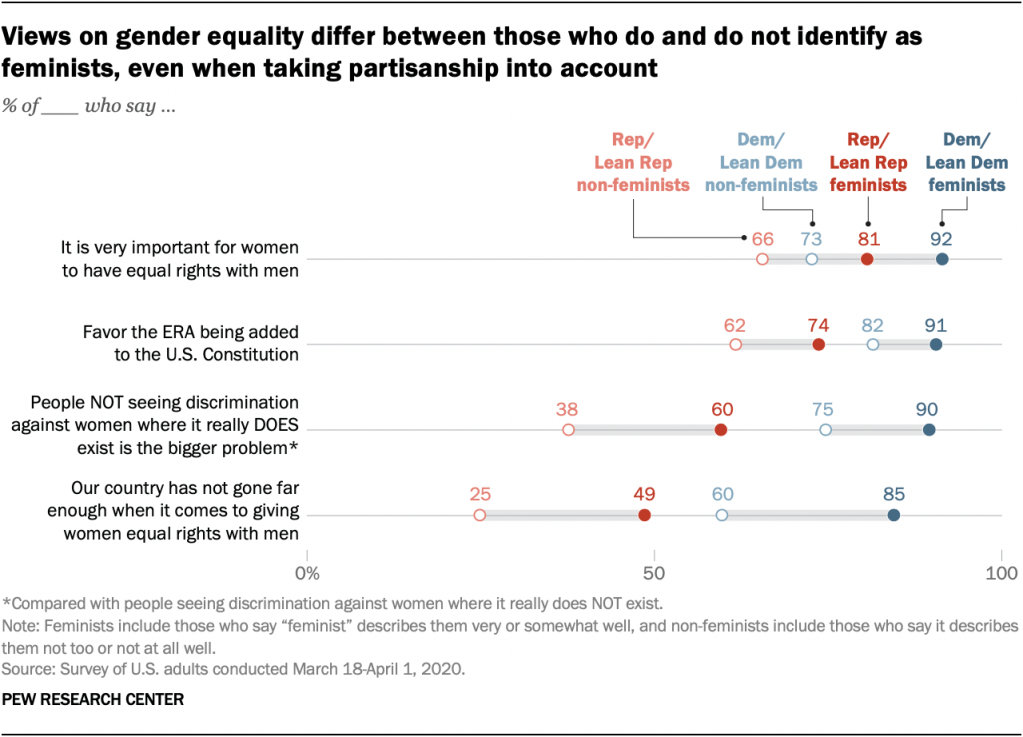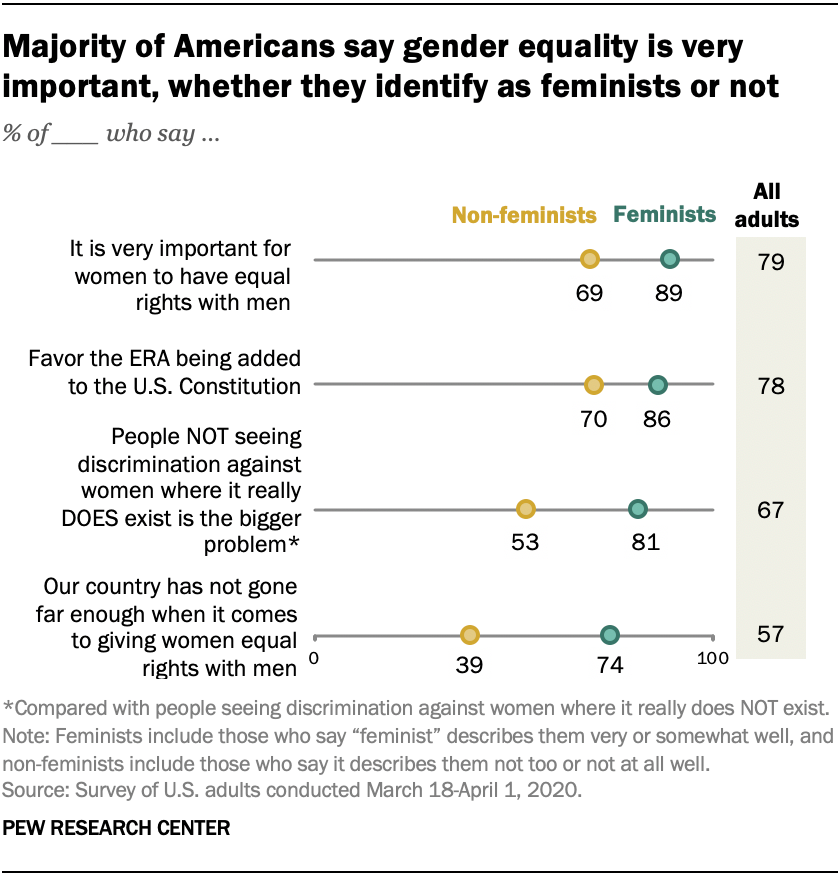Many of the values of the feminist movement have been accepted across the political spectrum in the United States, even among Americans who don’t personally identify as feminists, according to a Pew Research Center survey about gender equality that comes 100 years after the ratification of the 19th Amendment.
For example, a majority of Democrats and Republicans – whether they identify as feminists or not – say it is very important for women to have equal rights with men. Similarly, majorities in both partisan coalitions support adding the Equal Rights Amendment to the U.S. Constitution.
The survey comes as scholars and commentators debate the impact of feminism on women’s rights and broader American culture. Some argue that feminism has become universal and that the values and principles of women’s equality and empowerment have already been adopted to a large extent by society, no longer requiring identification with the label of feminist.
Pew Research Center conducted this study to understand Americans’ views on feminism, women’s rights and obstacles to gender equality. For this analysis, feminists include those who say “feminist” describes them very or somewhat well, and non-feminists include those who say it describes them not too or not at all well.
This analysis is based on 3,143 U.S. adults surveyed in March and April 2020, including an oversample of Black and Hispanic respondents. The adults surveyed are members of the Ipsos Public Affairs KnowledgePanel, an online survey panel that is recruited through national random sampling of residential addresses and landline and cellphone numbers. KnowledgePanel provides internet access for those who do not have it and, if needed, a device to access the internet when they join the panel. To ensure that the results of this survey reflect a balanced cross section of the nation, the data is weighted to match the U.S. adult population by gender, age, education, race and ethnicity, and other categories. The survey was conducted in English and Spanish.
Here are the questions used for this report, along with responses, and its methodology.
While the Center’s survey finds broad agreement on some aspects of gender equality, it also finds differences between self-identified feminists and non-feminists on other measures.
Feminists, for instance, are much more likely than non-feminists to say the country has not gone far enough when it comes to giving women equal rights with men (74% vs. 39%). Feminists are also more likely to say the bigger problem is people not seeing discrimination against women where it really does exist, rather than people seeing discrimination against women where it really does not exist. About eight-in-ten adults who identify as feminist (81%) say not seeing discrimination is the bigger problem, compared with 53% of non-feminists.
To some extent, these differences can be explained by partisanship: Feminists are far more likely than non-feminists to identify with or lean toward the Democratic Party. Overall, Democrats and those who lean Democratic are more likely than Republicans and Republican leaners to say gender equality is very important, and they are more than twice as likely to say the country has not gone far enough in giving women equal rights (76% vs. 33%). And while most Democrats (85%) say the bigger problem is people not seeing discrimination against women where it really does exist, a much smaller share of Republicans (46%) say the same.
But even when taking partisanship into account, differences exist between feminists and non-feminists. In both parties, for example, there are gaps of around 25 percentage points between feminists and non-feminists in the shares saying the country has not gone far enough in giving women equal rights with men. About half of Republican feminists (49%) say this, compared with a quarter of Republican non-feminists. While 85% of Democratic feminists say the country has not gone far enough, the share falls to 60% among Democratic non-feminists.

The same pattern appears on other questions. Six-in-ten Republican feminists say the bigger problem is people not seeing discrimination against women where it really does exist, compared with 38% of Republican non-feminists. Nine-in-ten Democratic feminists say this, compared with 75% of Democratic non-feminists.
Despite these differences, Democrats – including those who don’t identify as feminists – are more likely than both Republican feminists and non-feminists to say the country hasn’t gone far enough in giving women equal rights and that the bigger problem is people not seeing gender discrimination where it really exists. They’re also more likely to favor adding the Equal Rights Amendment to the Constitution – a view held by a majority of Americans overall, including 62% of non-feminist Republicans.
Note: Here are the questions used for this report, along with responses, and its methodology.

